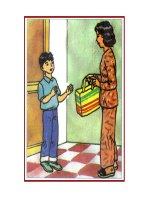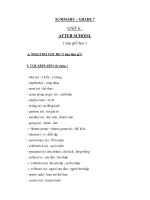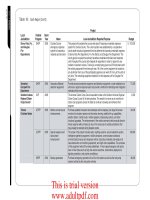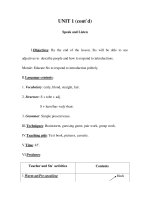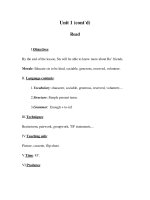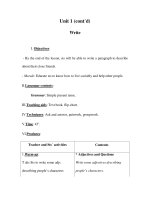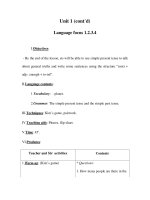UNIT 6 (cont’d) Speak ppt
Bạn đang xem bản rút gọn của tài liệu. Xem và tải ngay bản đầy đủ của tài liệu tại đây (25.27 KB, 5 trang )
UNIT 6 (cont’d)
Speak
I. Objectives: By the end of the lesson, sts will be able to ask for favors and
respond to favors.
Morale: Educate sts how to ask for favors and offer assistance politely
Skills: Speaking and writing.
II. Language contents:
Structures: - Asking for favors and responding to favors.
- Offering assistance and responding to assistance.
III. Teaching aids: poster
IV. Techniques: communicative, approach.
V. Time: 45ms.
VI. Produres:
Teacher and Sts’ activities
Contents
1. Warm-up:
1. What do you say to ask for a favor?
Can/could you help me?
T asks sts some questions to
elicit the new language.
Sts answer.
T checks and corrects their
answers.
Could you do me a favor?
Can/could you . . . . . . . . . . . . . ?
2. When do you ask for a favor?
need some help.
3. How do you say to respond to favors?
Certainly/of course/sure
No problem.
* Look at the phrases in the boxes-then
practice the dialogues with a partner.
2. Pre-speaking:
T sticks a poster of phrases on
the board.
T explains the meanings.
T reads the phrases on the
board.
Sts repeat.
Sts copy down.
Asking for favors
can/could you help
me, please?
Could you do me a
favor?
I need a favor?
can/could you . . .
.?
Responding to favors
certainly/of
course/sure
No problem
What can I do for you?
How can I help you?
I’m sorry. I’m really
busy.
offering
assistance
responding to
assistance
May I help you?
Do you need any
help?
Let me help you.
Yes/No. Thank you!
Yes. That’s very kind
of you.
No, thank you. I’m
fine.
3. While-speaking:
a. Repetition drill:
T asks sts to practise the
dialogues in pairs
Call some pairs to play the roles
the dialogues in front of the
class.
* Now use phrases in the box to make
simitar dialogues:
Who What Why
T corrects mistakes of
pronuncoation.
b. Substitution drill:
T asks Sts to work in pairs.
Sts replace sentences or phrases
underlined above.
(using phrases in the box)
Call some pairs to present in
front of the class.
T checks and corrects.
tourist
neigh
bor
friend
aunt
needs a find a
police station
need help
tidying yard
need help fixing
her bike
need to buy
some vegetables
lost money
has broken
leg
has a flat tire
is busy
cooking meal
4. Post-speaking:
T devides the class into 2 parts
(A and B)
T asks sts to make a simitar
dialogue about the following
situations.
Sts look at the pictures and
speak.
* Example:
A. Could you help me, please?
B. What can I do for you?
A. Can you turn on the lights for me?
B. Certainly.
1. Mai: . . . for me? (empty/waste-
basket)
Hoa: . . .
Mai: Thanks . . . of you.
T checks and corrects mistakes
of pronunciation
2. Nga: Do . . . of you? (need/help)
Lan: Yes. Could . . .? It’s heavy.
Nga: No, problem.
5. Homework:
- T: Educate sts how to ask for favors and offers assistance
politely.
- Learn the phrases by heart and prepare Unit 6 (Listening).
- Write a simitar dialogue between you and a tourist who lost
money.
6. Marks/Remarks:

